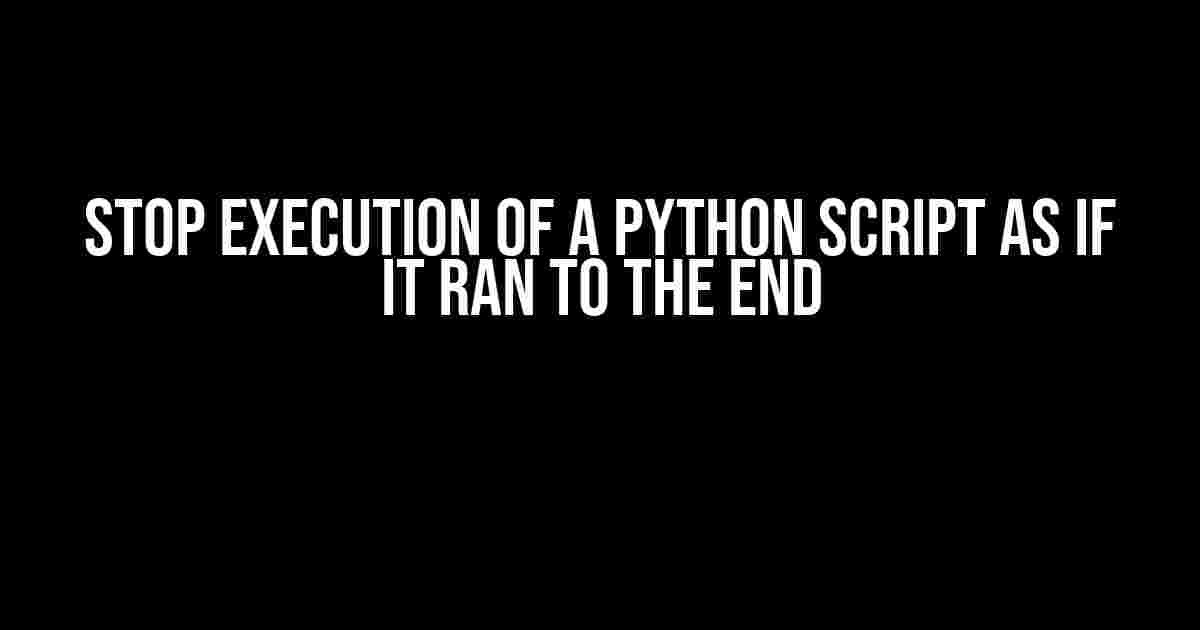There are scenarios where you might want to stop the execution of a Python script as if it had run to the end, without actually letting it finish. This can be achieved using the `os._exit()` function or the `sys.exit()` function. Here’s how:
Using the `os._exit()` function
The `os._exit()` function is a low-level way to exit a Python script. It does not perform any cleanup, and the program exits immediately. Here’s an example:
import os
print("Script started")
os._exit(0)
print("Script finished")
In this example, only “Script started” will be printed, and the script will terminate immediately after calling `os._exit(0)`. The `print(“Script finished”)` statement will not be executed.
Using the `sys.exit()` function
The `sys.exit()` function is a higher-level way to exit a Python script. It performs cleanup and then exits the program. Here’s an example:
import sys
print("Script started")
sys.exit(0)
print("Script finished")
In this example, only “Script started” will be printed, and the script will terminate immediately after calling `sys.exit(0)`. The `print(“Script finished”)` statement will not be executed.
Note:
When using `sys.exit()` or `os._exit()`, any finally blocks or try-except-finally blocks will not be executed. If you need to perform cleanup or execute certain code before exiting, consider using a try-finally block instead of these functions.
Also, note that `os._exit()` and `sys.exit()` should be used with caution, as they can lead to unexpected behavior or crashes if not used properly.
By using one of these methods, you can stop the execution of a Python script as if it had run to the end, without actually letting it finish.
Frequently Asked Question
Let’s get to the point where we’re done with our Python script and want to exit it as if it had run to the end! Here are some FAQs to help you do just that:
How do I stop a Python script from executing as if it had reached the end?
You can use the `sys.exit()` function, which allows your script to exit as if it had reached the end. For example, `import sys; sys.exit()` will terminate the script immediately.
Will `sys.exit()` affect any finally blocks or cleanup code?
No, `sys.exit()` bypasses finally blocks and cleanup code, so be careful when using it. If you need to ensure cleanup code is executed, consider using a try-finally block or a context manager instead.
What’s the difference between `sys.exit()` and `os._exit()`?
`sys.exit()` raises a `SystemExit` exception, which can be caught by try-except blocks, while `os._exit()` terminates the process immediately, bypassing any exception handling. Use `os._exit()` with caution!
Can I use `break` or `return` to stop the script execution?
No, `break` and `return` only exit the current loop or function, respectively. They won’t stop the script execution entirely. You’ll need to use `sys.exit()` or `os._exit()` to terminate the script.
Are there any alternatives to `sys.exit()` for stopping script execution?
Yes, you can use `raise SystemExit()` or `import signal; signal.raise_exception()` to stop the script execution. However, `sys.exit()` is usually the most convenient and Pythonic way to go.
Now, go forth and stop that script execution like a pro!

